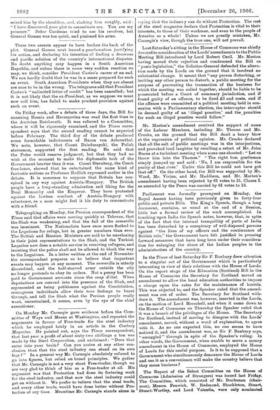In the Times of last Saturday Sir F. Banbury drew
attention to a singular act of the Government which is particularly interesting in view of their relations with the House of Lords. On the report stage of the Education (Scotland) Bill in the House of Commons the Secretary for Scotland moved an amendment to allow the local education authorities to impose a charge upon the rates for the maintenance of hostels. This was objected to, and the Speaker ruled that the amend- ment was Out of order. The Secretary for Scotland with- drew it. The amendment was, however, inserted in the Lords, on the motion of Lord Herschell, and when it came down to the House of Commons on Thursday the Speaker ruled that it was a breach of the privileges of the House. The Secretary for Scotland, instead of moving to disagree with the Lords' amendment, moved, without a word of explanation, to agree with it. As no one expected this, no one seems to have noticed it, and the amendment was, as Sir F. Banbury says, "smuggled" through in spite of the Speaker's ruling. In other words, the Government, when unable to move a money amendment in the House of Commons, employed the 'House of Lords for this useful purpose. Is it to be supposed that a Government who simultaneously denounce the House of Lords and use it as a convenience will make the country believe that they mean business ?






































 Previous page
Previous page